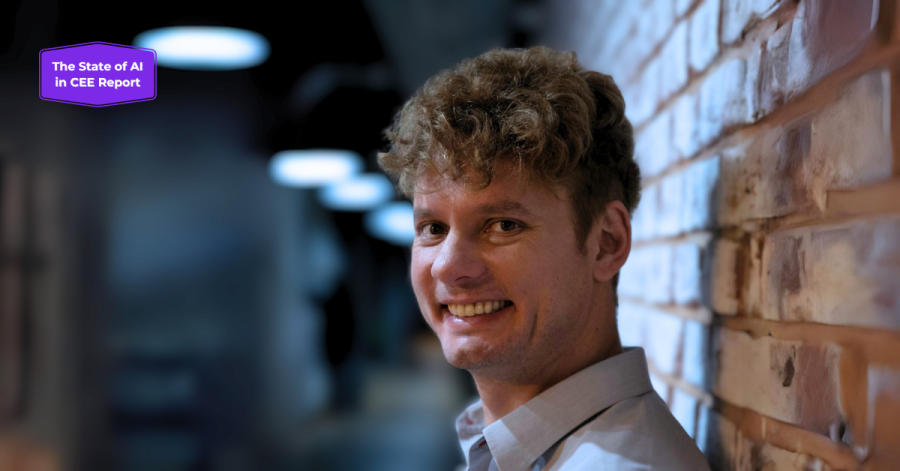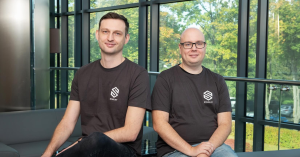In a world where automation has become key, Czech startup Filuta AI emerges to address the complex challenge of automating the very process of automation. Filuta seeks to simplify the deployment of artificial intelligence within Intelligent Automation frameworks, breaking down barriers that have, until now, hindered the widespread adoption of this transformative technology.
Led by founder and CEO Filip Dvořák, Filuta AI has secured a pre-seed investment of approximately €2.3 million since launching in 2022 – becoming the ‘youngest’ startup in the Czech Republic to secure such notable early-stage investment.
Dvořák is a seasoned entrepreneur and AI enthusiast, with 14 years of influential research in artificial intelligence. His expertise spans automated planning, machine learning, operational research, and optimization – documented in 20+ published articles and papers. As a CEO and startup advisor, he contributes extensive experience in the development of large-scale, real-time AI systems.
In light of our recent CEE AI Report, The Recursive sat down with Dvořák to discuss the challenges and opportunities the CEE ecosystem poses to AI startups. Furthermore, the interview dives into the company’s journey of securing funds, vision, and future plans.
The following interview was conducted as a part of The Recursive’s “State of AI in CEE” report. Download the full report with insights from 40+ experts and an analysis of 900 AI product companies from CEE.
The Recursive: How did the idea for Filuta AI originate, and how do you see your startup contributing to the development of the regional AI ecosystem?
Filip Dvořák: I have worked in the field of Intelligent Automation for more than 13 years. Based on that experience, I was looking at parts of the process of developing and deploying Intelligent Automation, focusing on automating those parts of the practice. As a result, we have created a visual filter to provide the automation of automation. So, we are deploying artificial intelligence automatically within automation frameworks.
From a practical point of view, it means that we are managing the whole lifecycle of automation services – such as services that control distribution centers, or supply chains. Our company has been founded on the idea of reducing the cost of deploying Intelligent Automation services, making it more affordable for use in the real world. We can summarize our vision as “democratizing Intelligent Automation”.
What are some of the biggest challenges during your solution’s development?
Filip Dvořák: There are always challenges with new companies. Considering the challenge of finding the right people, we are always open to hiring senior professionals, even remotely. Protecting our intellectual property is critical, and involves coordination of patenting with entities such as USPTO. We’ve been fortunate when building our customer base, as our investors have been very supportive in efforts to introduce us to new customers – but cultivating those connections still requires a significant time investment. There are more challenges in front of us, of course, and we try to overcome and practice them one by one.
What key factors led to securing substantial funding at an early stage of Filuta AI? What are your plans for the next 12-24 months?
Filip Dvořák: Solid credibility and the ability to point to proven scientific results in the field has been helpful. We have eight PhDs in the company, and an excellent academic footprint. It’s also good to have paying customers, and a minimum viable product (MVP). As a serial entrepreneur, I’ve co-founded and sold companies, which lends additional credibility. My last project was acquired for $180 million – which is reassuring to investors – so, we have been able to gain strong interest within the industry.
From our experience, there is an abundance of investors and a lot of money on the market. As I mentioned, if you have good credibility, MVP, and paying customers, then you can raise investments into the initial stages. We’ve had good luck with investors both locally, and within the US.
We hope that continues, as we plan to focus on scaling in the next two years, and that means hiring more people, especially in research and development. We’d like to grow our team by about 250% between now and 2024.
What is your perspective on the development of the AI startup landscape in the Czech Republic? What key trends are you observing?
Filip Dvořák: I think the pandemic has actually helped the startup landscape, as many people from large corporate companies in California have taken the opportunity to relocate, and they can have a very high quality of life in the Czech Republic. I have several founder friends who started their AI companies here, and some of them have already achieved “unicorn” status. The environment is growing, and Prague is one of the best locations to be if you want to establish an AI startup.
What motivated you to open your company in the Czech Republic, considering your previous experience in the US? What opportunities and potential does the local ecosystem bring?
Filip Dvořák: I’m Czech-American, and I originally studied in Prague. The cost of living and quality of life is excellent here, and the culture is closer to my heart. When I decided to set up my company, it felt like the right choice.
“That said, we now maintain a presence in multiple countries. Because we wanted to sell within the US, it made sense to establish our sales and marketing team there, and maintain our research and development center in the Czech Republic. About 60% of our employees are based in Prague – so we have the best of both worlds.”
As AI technologies continue to evolve, what ethical considerations guide your approach to developing and deploying AI solutions?
Filip Dvořák: At Filuta AI, we’re dedicated to leveraging AI to make life better and easier for everyone. I think the companies we work with are defining a radical approach to applications of AI. If AI is helpful to the company, and the company’s business is beneficial for humanity and improves the quality of life, that connects with our vision.
How do you anticipate the upcoming EU AI regulatory framework impacting the adoption of AI products and services? Are there any specific implications for the automation sector?
Filip Dvořák: While the regulations may have an impact, AI is being developed at such a rapid pace that regulations are generally post-hoc. I can’t predict how restrictive the space may become in the future, but at this moment, the regulations do not limit us in any way.
“Investment-wise, I would prefer to see more money spent on developing AI than on regulating it. From the perspective of the European Union and its successful development of local products, prioritizing funding for regulation over the development of AI will allow other ecosystems, such as the United States or China, to move further ahead.”
How would you evaluate AI talent’s current availability and quality in the Czech Republic? From your perspective, what are the most crucial AI specializations and skills in the region?
Filip Dvořák: We focus on hiring only the top 5% of experts in a respective field, regardless of where they are based. Though we would of course love to hire from within the Czech Republic, we’re also an international team, and open to cooperating with experts remotely.
Considering the specializations relevant to our work, the Czech Republic tends to present high-quality candidates in mathematics. I would say the education that Charles University, CTU, BUT and other smaller universities offer produces candidates on the same level as Ivy League universities.
However, I think Czech universities are a little less engineering-focused, and more theoretical. The industry in the US is more deeply connected to academia. This is not the case in the Czech Republic, where students usually study independently of the industry. This practice is not an ideal introduction to the job market. Providing students with internship opportunities in their final years of schooling allows them to more clearly understand the market, and their own needs. There have not been very strong incentives to do so in the Czech Republic, and I think this leaves room for improvement on the university and government sides.
What AI roles or skill sets are most in demand for Filuta AI and among startups? What expertise is currently the most challenging to find?
Filip Dvořák: We have permanently open positions in data engineering and symbolic reasoning, and we are always hiring. We are also looking for game developers with a strong background in computer science. Those candidates often prove more difficult to find.
Are there specific AI trends or advancements you believe will significantly impact the regional ecosystem within the next 5-10 years? How do you plan to stay at the forefront of those developments?
Filip Dvořák: There are many successful AI companies, and I believe we will see constant growth as more talent returns to the Czech Republic.
“We maintain strong connections within the academic environment, as we work with professors who are tuned into up-and-coming fields of research. We’re also monitoring the trends, and attending the top AI conferences. So before any type of new fundamental research is applied in practice, we see it at a conference, and we can evaluate if it could be applicable to our business cases. We are also doing our own Tech to Market – taking fundamental research findings and applying them to industries. So we believe that will help us maintain an edge.”







